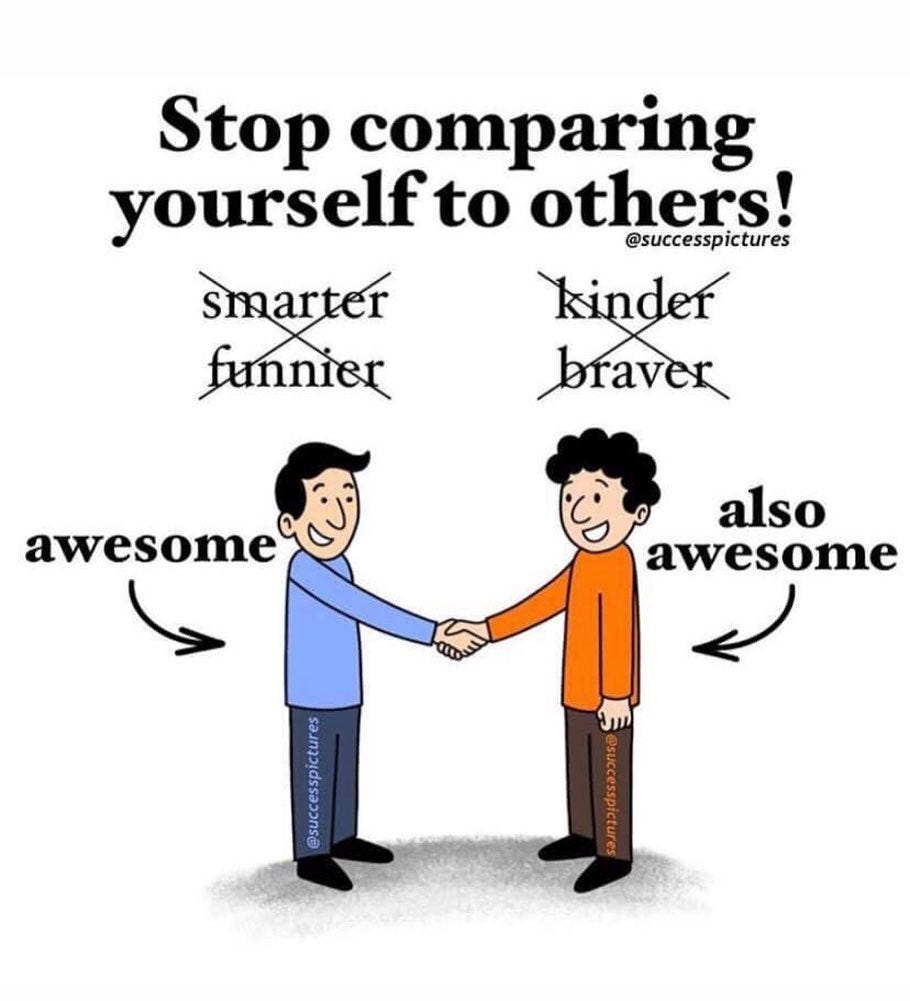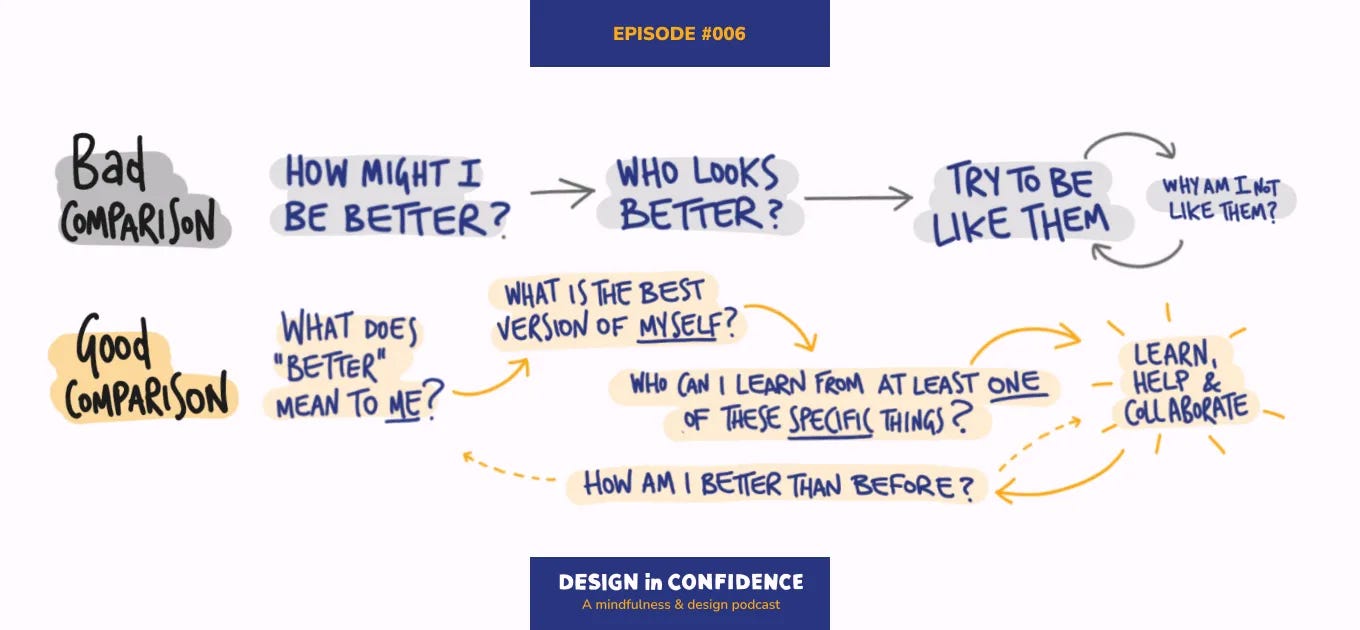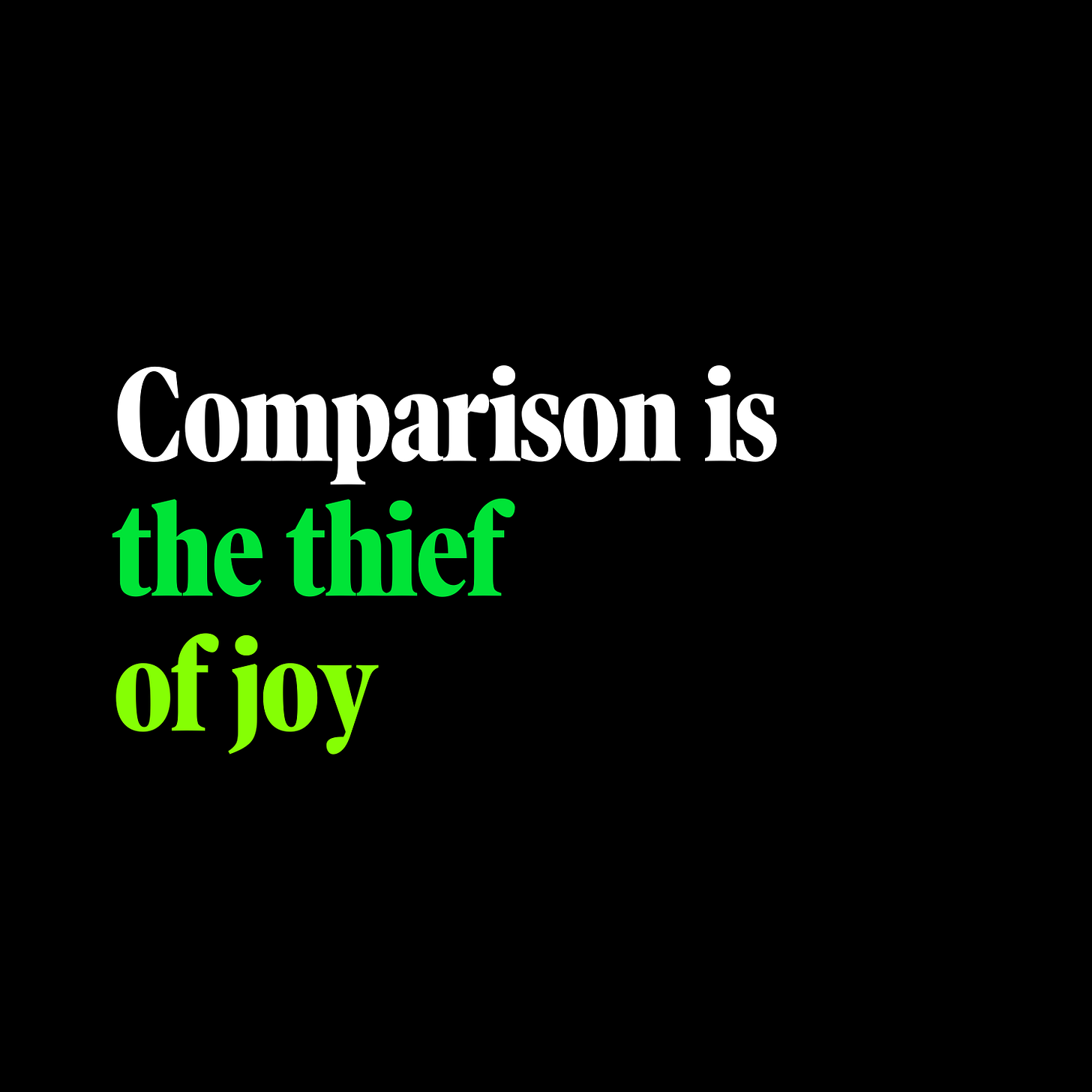"Do not compare yourself to others. Compare yourself to who you were yesterday."
Comparison is a powerful force, one that can either uplift or diminish us, depending on how we approach it. Left unchecked, it has the potential to erode our self-worth and happiness. Yet, when navigated with mindfulness, comparison can be a catalyst for growth, connection, and improvement. Whether you’re a software engineer, in product or another role entirely, it’s human nature to compare ourselves to others.
I was reminded by this idea in the quote “Comparison is the thief of joy” attributed to Theodore Roosevelt. Research supports this idea in several ways. For example, a study by Deri, Davidai, and Gilovich in 2017 found that people frequently compare themselves to highly visible, highly social individuals, which can lead to a biased perception of their own social lives and skills, often resulting in feelings of inadequacy.
Let’s explore how to approach comparison with intention, transforming it from a source of stress into a tool for progress.
Self-awareness: when and how you compare
"Don't compare your beginning to someone else's middle."
The first step in addressing comparison is cultivating self-awareness. I like to regularly ask myself “why” I’m comparing myself to understand the root cause.
Often, comparison happens beneath our conscious awareness, influencing our emotions and behaviors without us realizing it. Recognizing when and how we compare ourselves to others is crucial for breaking the cycle.
So, how do you develop self-awareness?
Pay attention to your mental chatter throughout the day. Notice when you begin to compare yourself to others - whether it’s scrolling through social media, hearing about someone else’s success on a call, or experiencing a setback. Identifying these moments is the first step toward gaining control over them.
Start a Google/Notion/text doc or journal where you can record instances of comparison. Note the context, your emotional response, and the impact it had on your mood and behavior. Over time, patterns will emerge, helping you understand what triggers comparison and how it affects you. It can be helpful to ask yourself “why?”, “what can this teach me?” and “does this actually matter?” in your reflections.
Engage in mindfulness practices that help you stay present and aware of your thoughts. Techniques like meditation or deep breathing can increase your awareness and help you observe your thoughts without judgment, making it easier to redirect them when necessary. When you’re overpowered by emotions, it can cloud your ability to think clearly. You might feel down in the moment when comparing yourself to someone, but realize it actually impacts you way less when you take a breather and really think about it deeply.
By becoming more attuned to the moments when comparison occurs, you empower yourself to make conscious choices about how to respond.
Shift your focus from others’ achievements to your own growth
"Focus on your own lane."
One of the most detrimental aspects of comparison is its tendency to focus our attention on what we lack rather than what we have.
This can lead to a perpetual state of dissatisfaction and longing. To counteract this, shift your focus from others’ successes to your own journey of growth and progress.
What are some subtle ways to refocus your attention?
Make it a habit to acknowledge and celebrate your own wins, no matter how small. I do this as part of my daily Todo list to remind myself what I’ve accomplished. Whether it’s completing a challenging task, hitting a personal milestone, or simply making progress in your daily routine, recognizing your achievements reinforces your value.
Create a system for tracking your growth over time. This could be a simple journal, a doc, or a visual chart. Regularly reviewing your progress helps you see how far you’ve come and keeps you focused on your own path rather than others’. You don’t necessarily need to build a system around this - simply reflecting about your progress on a walk every few weeks can work wonders.
Instead of measuring your success by others’ standards, set goals that are personally meaningful to you. After all, we’re all on our own journeys. Align your goals with your values, passions, and long-term aspirations. This way, your progress is defined by your own measures of success, not by how you compare to others.
Shifting your focus to your own growth helps you find fulfillment in your journey and reduces the need for external validation.
Manage social media mindfully
"It's important to remember that what people post on social media is often just a carefully curated version of reality."
Social media can easily fuel the comparison trap. While it offers opportunities for connection and inspiration, it can also distort reality and amplify feelings of inadequacy. I know I fall into this trap regularly on Twitter/Instagram/LinkedIn and I find having a strategy for it helpful.
The constant exposure to others’ curated lives on social media can exacerbate feelings of inadequacy and envy. This phenomenon is closely linked to decreased life satisfaction and increased depressive symptoms, as highlighted by research on the impact of social media on mental health in Psychology Today, 2021.
Managing your social media use mindfully is key to mitigating its negative effects.
A few ways you can create a balanced approach to social media:
When you do use social media, approach it with intention. Ask yourself, "What am I looking for here?" and "How does this content make me feel?" This mindful approach can help you identify and avoid content that triggers unhealthy comparisons.
Be intentional about the content you consume. Unfollow or mute accounts that trigger negative comparisons or make you feel less than. Instead, choose to follow accounts that inspire you, uplift you, and align with your values. Remember, you have the power to shape your environment.
Establish specific times of day when you check social media, and stick to a time limit. By setting boundaries, you can prevent social media from dominating your time and thoughts, reducing the chances of falling into the comparison trap. If this sounds a little too much, you can set some simple rules for yourself like ~ if I find myself heading towards a comparison trap, I’ll scroll by or just close the app.
Consider scheduling social media detox periods where you step away. I know plenty of colleagues who do this. Use this time to engage in activities that bring you joy and fulfillment offline, whether it’s pursuing a hobby, spending time in nature, or connecting with loved ones in person.
By managing your social media use mindfully, you can protect your mental well-being and reduce the impact of comparison on your life.
Embrace a growth mindset
"Comparison is a thief of joy, but it can also be a catalyst for growth."
A growth mindset is the belief that abilities and intelligence can be developed through effort, learning, and perseverance. When you adopt a growth mindset, comparison becomes a source of inspiration and motivation rather than a trigger for self-doubt.
Social cognitive psychologists have long noted that upward comparisons (comparing ourselves to those we perceive as better off) can diminish our self-esteem and happiness. Conversely, downward comparisons (comparing ourselves to those worse off) can temporarily boost self-esteem but do not lead to lasting happiness. This is supported by research by Davidai & Deri, 2019 that shows people often measure themselves against above-average others, even when it negatively impacts their self-perception.
How do you cultivate a growth mindset in the face of comparison?
Instead of seeing someone else’s success as a threat, view it as a sign that your goals are achievable. Ask yourself, “What can I learn from this person’s journey?” or “How can I apply their strategies to my own growth?” This shift in perspective turns comparison into a learning experience.
See challenges and setbacks as opportunities for growth rather than failures. When you encounter someone who excels in an area where you struggle, use it as motivation to push yourself further. Remember, mastery takes time, and every step forward is progress.
Practice celebrating the achievements of others genuinely. When you shift from competition to collaboration, you create a supportive environment that fosters mutual growth. This mindset not only reduces the sting of comparison but also strengthens your relationships with others.
When you see someone's success, try to appreciate the hard work and dedication that likely went into it. This shift in focus can help you see achievements as the result of effort rather than innate talent, reinforcing the growth mindset.
Comparing yourself with others from “Design in Confidence”
Embracing a growth mindset allows you to see comparison as a tool for improvement rather than a measure of inadequacy.
Practice gratitude: scarcity to abundance
"Gratitude unlocks the fullness of life. It turns what we have into enough, and more”
Gratitude is a powerful antidote to the negative effects of comparison. By focusing on what you have rather than what you lack, you cultivate a mindset of abundance and contentment. This shift in perspective can transform the way you experience comparison.
A few ways to incorporate gratitude into your daily life:
Take a few minutes each day to reflect on the things you’re grateful for. This could be as simple as listing three things each morning or evening. Over time, this practice trains your brain to focus on the positives in your life, making it easier to resist the urge to compare.
Use a journal to regularly record the things you appreciate about your life, relationships, and experiences. This serves as a tangible reminder of the abundance in your life and helps you maintain a positive outlook.
Take the time to express your appreciation to the people in your life. Whether it’s a heartfelt note, a kind word, or a simple thank you, expressing gratitude strengthens your connections and fosters a sense of community.
By practicing gratitude, you shift your focus from what you lack to the richness of your life, reducing the impact of comparison.
Foster relationships, not division
"Mindful comparison can be a bridge to connection, not a barrier."
Comparison often leads to feelings of isolation, as we perceive ourselves as separate or inferior to others. However, when approached mindfully, comparison can be an opportunity to connect, share, and build relationships.
To mitigate the negative effects of comparison, it is crucial to focus on personal growth and self-improvement rather than comparing oneself to others. Recognizing and adjusting unrealistic comparison targets can help maintain a healthier self-view, a strategy supported by research showing that people often hold themselves to overly high standards of comparison.
Turning comparison into a tool for connection:
• If you admire someone’s achievements, consider reaching out to them for advice or mentorship. Most people are willing to share their experiences, and this can turn comparison into a positive, collaborative relationship.
• Be open about your own struggles, challenges, and successes. Sharing your story creates empathy and understanding with others who may be experiencing similar challenges. This openness fosters a supportive community where comparison becomes a tool for mutual encouragement.
• Join groups or communities (discords, subreddits etc) that share your interests or goals. Working together towards a common objective shifts the focus from individual achievement to collective progress. This reduces the competitive aspect of comparison and emphasizes collaboration and support.
By using comparison as a means to connect rather than divide, you can build stronger, more supportive relationships that enhance your overall well-being.
Wrapping up
I hope you’ve found some of the ideas in this write-up helpful. Remember that your worth is not determined by your comparison to others. The only person you should be competing with is yourself.
When approached with mindfulness, comparison can indeed be a tool for growth rather than a thief of joy.








This article is super actionable and a great reminder of how to handle comparisons with others. I often catch myself comparing in a negative way, and it’s refreshing to see tips on how to shift that mindset. Thanks for sharing these insights!
Comparison is the master illusionist, making you believe you're running a race when you're actually on your own path.